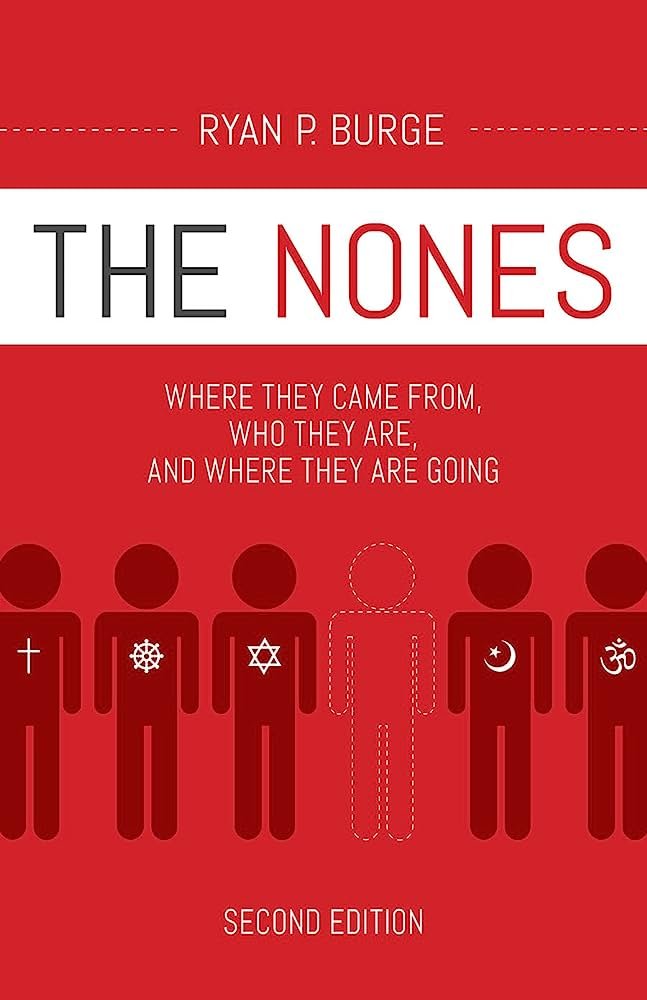The Nones by Ryan Burge
/The Nones: Where They Came From, Who They Are, and Where They Are Going
By Ryan P. Burge
Fortress Press 2023
The “nones” named in the title of this new second edition of Ryan Burge’s The Nones: Where They Came From, Who They Are, and Where They Are Going refers to the large and steadily-growing number of respondents to any general survey who get to the part where they’re supposed to check off which religion they belong to and check “none.” For the last forty years, the size of the percentage-pie taken by “nones” has grown larger and larger, now equaling or surpassing the size of some major denominations. And once again, as with the book’s first edition, this second edition of The Nones at first seems to be setting itself up as a disinterested inquiry into this phenomenon.
But it’s not. The Nones is indeed a good, readable inquiry – but it’s about as disinterested as a warden during a jailbreak.
The clue to the stew is the crew, as the saying goes. Yes, Burge is an assistant professor of political science at Eastern Illinois University, but he’s also research director for something called Faith Counts, which is described as “a nonprofit, multifaith organization with the goal of promoting the value of faith to the general public.” And if all that weren’t bad enough, he’s also a pastor in the American Baptist Church, for the love of Mike. And the book is published by Fortress Press, the publishing house of the Evangelical Lutheran Church in America. And so we have the silent parts of the title: The Nones: Where They Came From [Hell], Who They Are [lost sheep], And Where They Are Going [back to Hell, mostly likely].
Burge goes over the details of the downward spiral currently being experienced by virtually every religion in the world, and he explores a variety of possible explanations, everything from the prevalence of social media to survey methodology (“One surefire way to get closer to truthful answers is to conduct surveys online instead of face to face,” he notices. “People are much more likely to be honest with a computer browser than a human being”). Throughout, he compares the current plight of Christianity (the obvious focal point here; Burge wouldn’t care all that much about empty mosques) to a styrofoam cup filled with water:
Churches have always had pinholes punched in the sides of their cups. They would lose water through the deaths of their older members, but the water kept being replenished by young families bringing their children or by members converting people from the community. For many, the water being poured in vastly exceeded the amount that was lost through the pinhole-sized leaks. Now those small drips have become gaping holes, and the water is leaving rapidly … If the flow of water into the cup slows down even more or the holes expand in diameter, the cup is going to run empty at some point in the near future. But all is not lost.
That “all is not lost” of course gives away the fact that The Nones is not a study but a lament. An actual sociological study wouldn’t care how full the styrofoam cup was. And if Burge himself is concerned by what a large role in “replenishment” is played by the indoctrination of children, he gives no hint of it in these pages – nor does the possibility that the cup itself is every bit as toxic as styrofoam seem to bother him. The book is gamely and interestingly written (obviously – have you ever heard a boring Baptist homily?), but exactly this lack of curiosity pervades a book ostensibly devoted to an expanding demographic segment very likely driven by curiosity.
“If I were a younger man, this is the part of the book where I would try to offer some sage wisdom and practical advice to fill the pews back up,” Burge writes at the conclusion of his book. “However, experience tells me that there is no easy answer.” Seek, and ye shall find: the two most obvious easy answers to the question of why “nones” are proliferating are first, that organized religions aren’t offering anything sufficiently worthwhile to fill those empty pews, or second, that social media and instantaneous world-wide communication is showing increasing numbers of people that organized religions never could. People are leaving organized religions because they no longer need them – for world views, for a sense of wonder, and most importantly, for community. The Nones tells its readers at least a bit of where “nones” come from, who they are, and where they’re going instead of going to church – but it seeks a cure, not a consensus.
Steve Donoghue is a founding editor of Open Letters Monthly. His book criticism has appeared in The Washington Post, The American Conservative, The Spectator, The Wall Street Journal, The National, and the Daily Star. He writes regularly for The Boston Globe, the Vineyard Gazette, and the Christian Science Monitor and is the Books editor of Georgia’s Big Canoe News.
